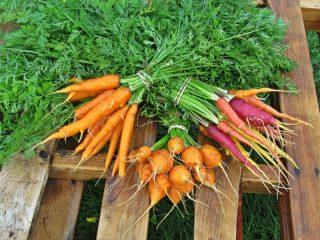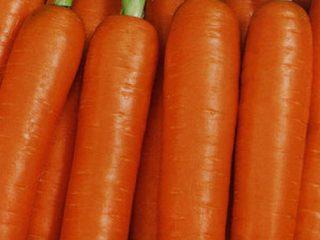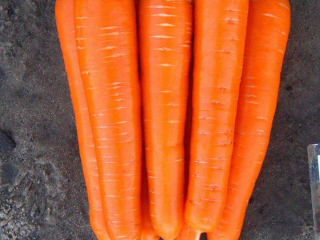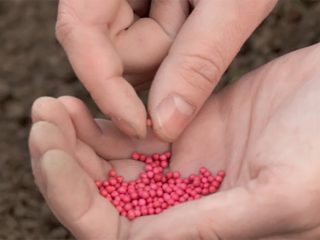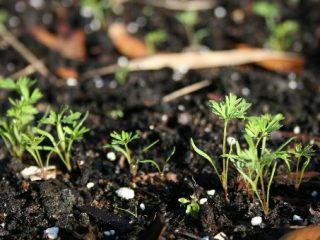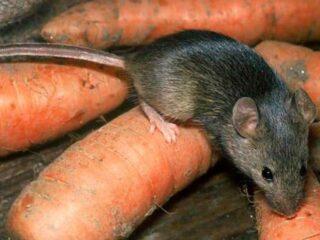Content
Carrot Nantes 4 is a Russian variety, known for more than 80 years. It has good resistance to diseases and pests, and tolerates short-term drought and frost. The crop is approved for cultivation in most regions and produces a consistently high yield (at least 2.5 kg per square meter). It has a sweet taste and presentation.
History of appearance
The Nantes 4 carrot (Daucus carota L.) is a variety developed in the 1930s. It was included in the register of selection achievements in 1943. The originators are:
- Federal State Budgetary Institution "Federal Scientific Center for Vegetable Growing";
- Agrofirm Aelita LLC;
- Agrofirm Poisk LLC;
- Nasrullaev Niyazi Mehyeddin;
- IP Head of Peasant Farm Karakay Irina Timofeevna.
Description of carrot variety Nantes 4
Nantes 4 carrots are a variety, so their seeds can be used to grow new plants. The leaves are medium sized and green.
The root crops are small, reaching 14-17 cm in length, weighing from 90 to 160 g. The shape is cylindrical, the tip is blunt.The core is weakly expressed, practically absent. The color is rich orange. The head is partly concave, 2 cm in diameter. At the end of ripening it becomes greenish or purple.
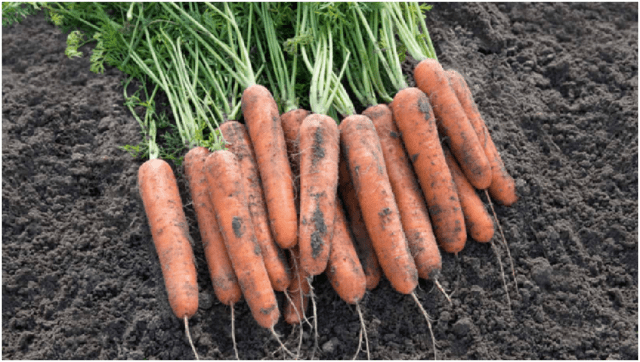
Root vegetables have a regular cylindrical shape
The taste of carrots of the Nantes 4 variety is moderately sweet, pleasant, the flesh is juicy and tender, sometimes with a reddish tint. The percentage of carotene is up to 19 mg per 100 g. The purpose is universal. The harvest is used to prepare various dishes. The vegetable is suitable for dietary nutrition. Root crops are long-lasting and transportable.
Characteristics of carrots Nantes 4
The Nantes 4 variety is one of the most unpretentious. Carrots tolerate adverse weather conditions well, including temperature changes. The ripening period is short. The harvest can be harvested as early as the end of July.
Maturation period
In terms of ripening time, the Nantes 4 carrot variety is classified as mid-season. Root crops reach technical maturity within 78-108 days from the moment of sowing. This allows the crop to be grown in most Russian regions, even in areas with short and cool summers.
Carrot yield Nantes 4
The productivity of the Nantes 4 variety is consistently high. Depending on the soil and growing conditions, the figure reaches 2.5-6.5 kg. When grown on an industrial scale - from 25 to 65 t/ha. The marketable yield of carrots is 78% and higher. This allows the vegetable to be grown on an industrial scale.
Resistance to diseases and pests
Nantes-type carrots are immune to most diseases and pests. The description of the variety states that the crop is resistant to flowering and bolting.
Growing regions
The carrot variety Nantes 4 has passed successful tests and is approved for cultivation in most Russian regions:
- middle lane;
- Volga region;
- Chernozem region;
- southern regions;
- Northwest;
- Western and Eastern Siberia;
- Far East.
Advantages and disadvantages
The Nantes carrot variety has been known for many decades. It is popular among summer residents and farmers due to its unpretentiousness, good yield and other advantages.
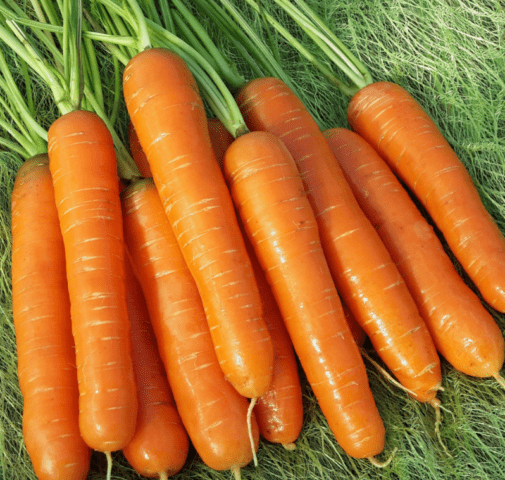
Nantes carrots are distinguished by their presentation and pleasant taste
Pros:
- high productivity;
- low maintenance requirements;
- resistance to diseases and pests;
- relatively fast maturation;
- can be grown in different regions;
- good keeping quality and transportability.
Minuses:
- the yield indicator depends on growing conditions and weather;
- may suffer from fungal diseases.
Features of planting and care
It is better to purchase Nantes 4 carrot seeds from originators or other trusted suppliers. They can be planted directly in open ground, without growing seedlings. The optimal temperature for germination is from 10 to 15 degrees Celsius. Therefore, planting can be planned for the middle or second half of May (depending on the weather forecast and climatic characteristics of the region).
If you plan to send the crop for winter storage, it is better to choose an even later date - from the end of May to the first half of June. The seeds can withstand short-term return frosts down to -5 degrees, but it is better not to take risks and not to rush into planting.
The place should be open, well-lit, without stagnant water (not a lowland). The optimal soil is light and fertile. Loams with a slightly acidic or neutral reaction (pH from 6.0 to 7.0) are preferred. A month before planting carrots of the Nantes variety 4, the plot is cleaned, dug up and complex fertilizer is applied (40-50 g per 1 m2) or humus, compost (5 kg per 1 m2).
The seeds are pre-soaked in a warm solution of Epin, potassium humate or other growth stimulants. After a few hours, they are etched in a weak solution of potassium permanganate (no more than 20 minutes). When landing, proceed as follows:
- Mark a furrow 2-3 cm deep. Retreat 10 cm and mark a second and third stripe.
- Plant the seeds at a distance of 4-5 cm so as not to thin out later.
- They fall asleep, trample the soil, water.
Further care for carrots of the Nantes 4 variety comes down to the following actions:
- Water daily for the first two weeks, then once every 10 days. In hot weather twice as often.
- Loosening the soil, weeding.
- Mulching with mowed grass, sawdust, hay (the material is placed between the rows).
- Feeding is given twice: after 3-4 leaves appear, then at the end of July. To do this, use a complex mineral fertilizer or a mixture of urea (10 g), potassium salt (15 g) or superphosphate (25 g). The quantity is indicated for processing 1 m² of plantings.
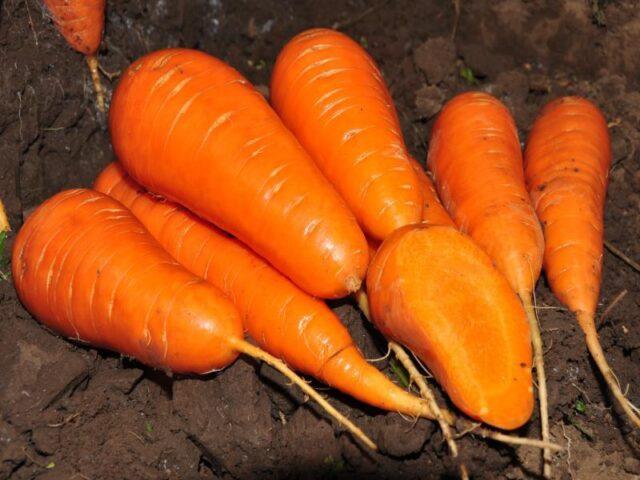
The variety is undemanding to care and produces a stable harvest
Pest and disease control
Carrots of the Nantes 4 variety are resistant to diseases and pests, but with improper care (excessive watering, lack of fertilizing) and in rainy summers they can suffer from fungal infections (Phomosis, Alternaria). Therefore, for prevention, seedlings can be treated with a fungicide:
- "Signum";
- "Ordan";
- "Fitosporin";
- "Maksim".
During the growing season, an invasion of carrot flies, aphids, and psyllids is possible. They can be dealt with by treating Nantes carrots with 4 folk remedies. For these purposes, a decoction of tomato tops, potatoes, marigold flowers, an infusion of wood ash, garlic cloves, tobacco dust, wormwood and other herbs with a fragrant aroma are used.In extreme cases, insecticides are used: “Aktara”, “Karate”, “Borey”, “Fitoverm” and other drugs.
At this point, it is allowed to spray only with homemade solutions prepared independently.
Harvesting and storage
Harvesting is carried out 80-100 days after emergence. Young root crops can be harvested after 50-60 days. 2-3 weeks before harvesting, they stop watering the carrots; during harvesting, the greens are immediately cut off, leaving petioles 2 cm long. When the carrots dry, the entire head with buds is removed by 2-3 cm.
Carrots of the Nantes 4 variety are shelf-stable, resistant to mold and rot. The harvested crop is stored in a cellar or barn, on an insulated balcony, glazed loggias or special warehouses. Storage conditions: darkness, temperature from 0 to 2 degrees Celsius. At lower values, the pulp will begin to taste bitter; at high levels, it will become flabby. Humidity should be around 95%.
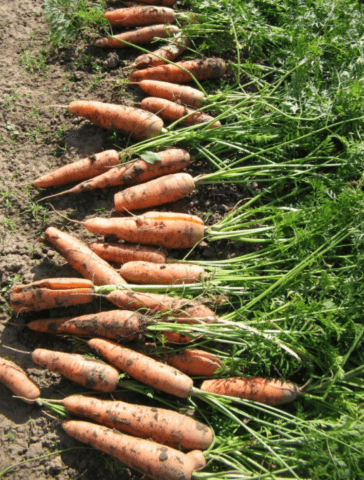
Harvesting is carried out in sunny, dry weather
Conclusion
Carrot Nantes 4 is one of the best varieties, which is positively assessed by almost all gardeners. The seeds show good germination and can withstand short-term frosts. The ripening period is short, so the entire harvest can be harvested in July–August.
Reviews from gardeners about carrots Nantes 4
